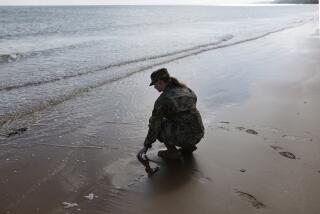Remembering a German Cemetery
- Share via
Last summer as my wife and I drove through northern France during the D-Day celebrations, she noticed in the guidebook a cemetery for German soldiers. It was several miles inland from the landing beaches near the small village of Isigny on one of the less-traveled roads.
Curious, we found Isigny without difficulty but were unable to locate the cemetery until after stopping at a cafe for directions.
It was time for lunch, and we were the only customers in the place, so we had a snack and, with some hesitation, asked about the cemetery. We weren’t sure how the French still felt about the Germans.
“We heard there was a German cemetery near here,” I said.
“Yes,” the proprietor replied in English, apparently unoffended, “it’s just beyond the town about a kilometer.”
Then we asked how it came to be: a cemetery for dead members of the occupation on French soil.
The proprietor said it was no problem, and that there had never been one incident of vandalism or other sign of resentment in all the years it had been there. We found it alongside the road, behind a simple stone wall, unmarked, with no gates but a center archway that was the entrance, with alcoves on either side where the names of the dead were engraved on the walls.
A family was studying the names, speaking softly in German.
Through the arch was a well-kept, grassy plot of perhaps four or five acres with stumpy black crosses planted between metal plaques laid in the ground, noting that there were two soldiers to a grave site.
In the center was a hill topped by a larger black cross flanked by two dark, shrouded figures--very grim, very gloomy.
On the side of the hill was a plaque with an inscription in German.
The memory has become poignant recently with the furor over President Reagan’s planned visit today to the German war cemetery at Bitburg. We wondered about the inscription and what relevant commentary it might have.
Wilm Pelters, a professor of German at Cal State Long Beach, translated it:
“The hill swells somberly over the graves of the soldiers. God’s commandment stands darkly over the war dead. But the heavens glow brightly over the looming crosses. More brightly still glows their consolation. God has the final word.”
Which, after all, is probably the way it should be.
More to Read
Sign up for Essential California
The most important California stories and recommendations in your inbox every morning.
You may occasionally receive promotional content from the Los Angeles Times.













